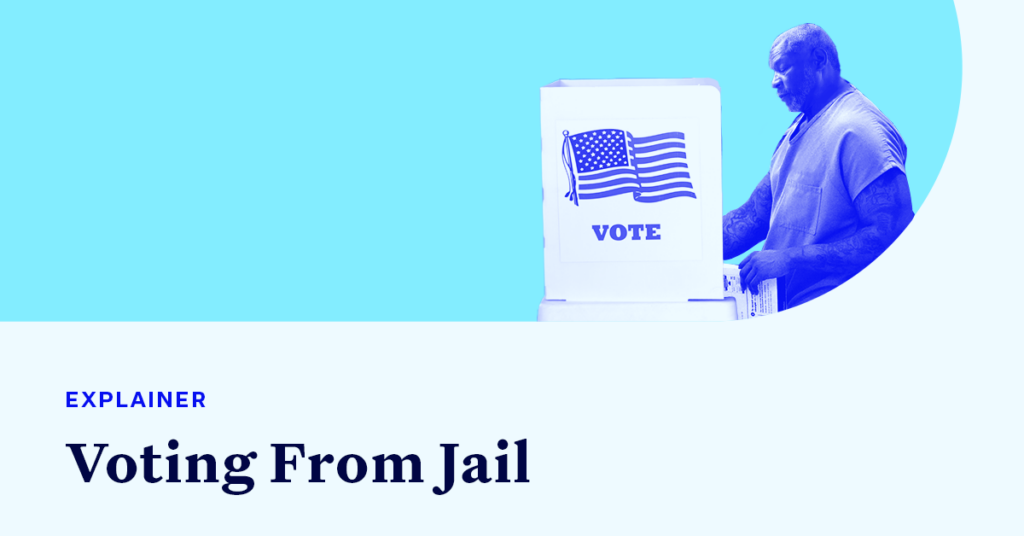Who Can Vote From Jail, and How?

When we talk about the intersection between voting rights and the criminal legal system, the focus is often on felony disenfranchisement: laws that disenfranchise millions of Americans on the basis of a felony conviction, both during and after release from incarceration.
But, felony convictions are not the only reason someone may be sitting behind bars. In fact, there are hundreds of thousands of eligible incarcerated voters every election who face unique barriers to exercising their constitutionally guaranteed right.
Who can vote from jail?
There are several reasons why voters may be eligible to vote from jail, mainly: an individual is held pretrial, meaning they have not been convicted of any crime, or an individual was convicted of a misdemeanor offense in a state where that has no bearing on eligibility status.
According to a March 2023 report from the Prison Policy Initiative, 466,000 individuals are currently held pre-trial and have not been convicted of any offense. The large majority of those locked up awaiting trial are located in local jails. People can sit in jail for months before a trial is scheduled, largely for financial reasons — they are unable to pay cash bail.
Though people use the terms interchangeably, prisons and jails are distinct entities: Jails are city- or county-run facilities predominantly housing pre-trial detainees and occasionally, people serving sentences. In contrast, prisons are federal- or state-run facilities where people convicted of crimes serve their sentences.
Another important distinction lies in the type of offense someone is convicted of: felonies or misdemeanors. There are only six states — Illinois, Indiana, Kentucky, Michigan, Missouri and South Carolina — that revoke voting rights for people convicted of misdemeanors. In the other 44 states, all people serving sentences for misdemeanors remain eligible voters while incarcerated. (However, a handful of states disenfranchise people for voting-related misdemeanors.)
In Maine, Vermont and Washington, D.C., all incarcerated citizens can vote from jail or prison. These three jurisdictions are the only places that do not disenfranchise any voters on the basis of felony convictions.
What are the barriers to voting from jail?
General confusion about who among the justice-impacted population is eligible to vote is one of the largest barriers to voting. Given the patchwork of felony disenfranchisement laws and jail-based voting rules across the country, voters may be unaware that they are eligible or fearful of accidentally voting while ineligible.
By Corey “Al-Ameen” Patterson, chair of the African American Coalition Committee in MCI-Norfolk.
Additionally, eligible incarcerated voters remain reliant on sheriffs and other jail officials to relay accurate and complete information and facilitate voting. The Marshall Project recently conducted a survey of sheriffs and found that these officials are overwhelmingly white, male and conservative; less than 1% of the respondents self-identified as liberal. Yet, Black and Latino communities are overrepresented in a policing and prison system that exacerbates racial disparities.
Incarcerated voters also face immense challenges in obtaining the physical materials necessary to vote, including voter registration applications, mail-in ballot applications, mail-in ballots, postage stamps and more. They often lack access to information about voter registration eligibility, deadlines and candidate platforms.
Voting while incarcerated implicates the problem of prison gerrymandering, the practice of counting individuals for the U.S. Census where they are incarcerated, rather than where they call home. A similar issue arises for voter registration purposes; while most incarcerated voters would likely prefer to register to vote in their home communities, where their family and friends are impacted by policy decisions, a lack of a stable home address can complicate matters. Incarcerated people who previously faced homelessness or housing instability face additional hurdles for voter registration and absentee ballot purposes.
Finally, election officials can be equally confused around the rules for eligibility. Surveys conducted by the ACLU and Brennan Center for Justice between 2003 and 2008 concluded that election officials often do not know the basic eligibility rules governing people in the criminal legal system. For example, over 30% of county clerks in Ohio, including a representative from the secretary of state’s office, responded incorrectly or noted uncertainty over whether Ohioans lose the right to vote while incarcerated for a misdemeanor. On the rare occasion that an eligible incarcerated voter can request or cast a ballot, election officials’ confusion over their own voting rules can translate into an unduly rejection of ballots.
What’s next for jail-based voting?
In Cook County, Illinois, home to Chicago, pre-trial detainees are able to cast a ballot through a pioneering civic engagement effort. During the March 2020 Illinois primary elections, the Cook County Jail became the first jail in the country to serve as a polling location. In the February 2023 Chicago mayoral election, over 50% of the jail’s eligible voters cast a ballot, a higher turnout rate than the citywide voting population.
Legislation can also help reduce barriers to voting: In 2022, Massachusetts enacted an omnibus election law that included provisions outlining expectations for sheriffs and election officials to ensure meaningful ballot access for eligible incarcerated voters. Washington lawmakers are advancing a bill this session to similarly remove hurdles for jail-based voting.
Unlike felony disenfranchisement — which requires policy changes to extend the franchise — eligible incarcerated voters have a constitutionally guaranteed right that simply needs to be valued in practice.